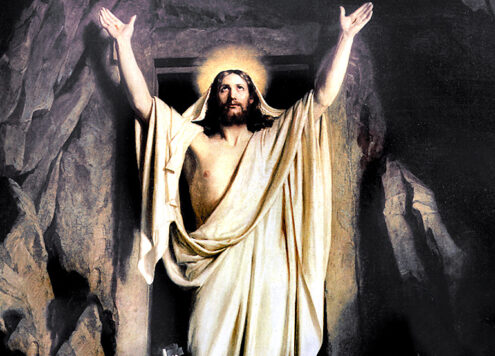Christian imagination has been captured by the Magi from the time Matthew first told the story. Who were they? Where in the east did they come from? Were they kings? In the world into which Jesus was born, the word, Magi, could mean various things: wise men, members of Persia’s priestly caste, possessors of occult knowledge, astronomers. Whatever the truth of the matter, one thing is obvious: Matthew tells a gripping story.
The story of the Magi in the gospel of Matthew, chapter 2 is a story about wise men who were open to God’s intervention in time. They came to see the Savior, were guided by the light of faith and, when they found Him, they brought Him gifts. Even though they were pagans and did not possess the Word of God in Scripture like Herod, who plotted to kill the Savior, they were led by the gift of faith. Matthew portrays Jesus in this story as being accepted by the Gentiles ( the three wise men from the east ) while being rejected by His own people. This theme is not new in the New Testament. St. Paul, the apostle of the Gentiles, speaks about the universality of Jesus’s message in Ephesians, chapter 3 that welcomes everyone into Christ’s kingdom. Matthew, however, gives it an interesting twist. He contrasts the likes of Herod, who was gifted with God’s word in Scripture, with the pagan Magi from the East who followed their inner voice, their star, and were led to Jesus. In a strange twist also, it is Herod and the Scribes who directed the Magi to Bethlehem where they found their Savior. God works in strange ways! He can even use unwitting enemies to accomplish His will.
On this feast of the Epiphany we recall that, like the Magi, we are children of the light, recipients of the gifts of faith, hope, and love which we are called upon to share. We are given a wonderful opportunity to celebrate what the Lord has given us. Now, right now, is the time to wake up to this reality, to understand that time passes without permission but not without purpose. We can make plans for the future or recall memories of the good old days, but the only time we have is the moment at hand. Like the Magi, we are partners with God in the totally unpredictable present moment. Think about it! The only time that is truly yours and mine is this time which we are in right now. As a nation, Americans are good at preparing for the future, a new invention, a career, a degree, but with emphasis on the future. But what about the art of living, the art of becoming wise in the daily conduct of our lives that improves the quality of our day by bringing to the fore the transforming power of Christ’s love? This is what we need to focus on today. Our lives are too precious to ignore the grace of the present moment, to find God in the ordinary as well as the extraordinary, in the little things of life, in the unexpected.
The word Epiphany comes from the Greek and it means manifestation or appearance. Our faith must be alive and open to on-going manifestations or little revelations of the fruits of faith, hope and love in our lives. Christian tradition insightfully refers to the Epiphany as ‘little Christmas’ because it represents our humble way of accepting the new life of Jesus into our lives. Faith is not a static possession and neither are hope and love, They are not gifts to be hidden away but must shine through the lives we lead. They must grow and develop and touch those around us in as many ways as possible. Some people, like Herod in today’s Epiphany story, choose the path of death. Others, like the Magi, choose the path of life. Today, we are called to recommit ourselves to the cause of new life through faith that gives meaning to our lives, through hope that gives purpose to our lives, and through love that enables us to love the way Christ loves us. Make time for your friends, to visit them, and to help them in their time of need. And, be a friend to anyone who has no friends, especially the least of those among you. Time spent like this is never a waste of time. It is of the essence.
I’m reminded of a story about a Mother and daughter who were leaving Church. The little girl had an Epiphany and turning to her Mother, asked: “Is it true what the priest said in Church that God is love?” The Mother replied: “Yes, darling. It is true that God is love.” The little girl continued: “Is it true also that God is within you, like the priest said?” “Yes” replied the Mother, “the Kingdom of God is within you.” Looking up at her Mother, with wonder in her eyes, the little girl responded: “If God is love, and if God is within you, then He has to shine through you.”
May the Lord surprise you with His joy as you experience His awesome presence in the present moment.
Have a happy and joy-filled Epiphany.
Fr. Hugh Duffy











5 Comments
Connie
Wonderful! Really touched my heart. Thank you so very much.
Robert Galligan
Thank you as always Father
cecile m erlsten
Thank you Father and in todays world it is so needed… I often wonder if we al took the time to see the light of Christ in one another, what else would we need to have a peaceful world?.
As always your message is timely and so appreciated, God bless you.
Hugh Duffy
Good to hear the comments from all of you.
Glad you’re now getting these blogs, Cecile. It’s a long time hearing from you. Here’s wishing you every joy in your new position.
Terry Morton
Absolutely Brilliant Fr. Duffy. Such beautiful and so appropriate words for the Feast of The Epiphany.Thank you so much for sharing this it was so beautiful. I loved it. I will pass it to my daughter whose date of birth is the 6th January.